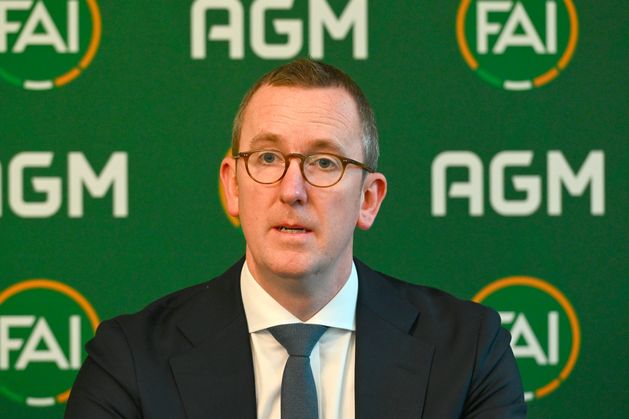FAI vow to act on ‘loophole’ of club ownership amid Dundalk trauma with academy plan for cash from EU’s Brexit fund


Finance is key to the short-term survival of Dundalk, whose owner Brian Ainscough went public on their financial plight last week. Players are believed to be up to date with wages, having gone unpaid for a short spell, but the focus now is on making sure that the club can at least see out the season, though interim FAI CEO David Courell was unable to guarantee that they would survive to season’s end, saying “as of now, they are taking the field”.
Courell added: “Our full energy is going in to try and help Dundalk come through this challenging period. The reality is we are eight or nine weeks away from the conclusion of the season. It’s been a very competitive league this year, we want to see it come through unimpacted by this.”
The trade union that represents players, the PFAI, have asked the FAI for clarity on what financial plans new owner Ainscough had in place for the club when he bought it earlier this year, and the union have contacted the national association to query the terms of a so-called “owner’s test” before a change of ownership is approved by the FAI.
Speaking after Saturday’s AGM, Courell said Ainscough had passed tests on “Garda vetting, background checks to ensure the integrity of any future owner of a club stands up to what we expect” when he was owner of Kerry FC, but he admits it was not proper that those checks simply transferred over to Dundalk when Ainscough sold his stake there and bought Dundalk.
“We are in 2024 and the reward of the licence was granted in November 2023. The club changed hands after that in December 2023, as a result the financial checks were done on the previous ownership.
“Lessons will be taken away from this process that any future transfer of ownership, that loophole will be closed. There are a range of other leagues across the continent that don’t have the same rigour when it comes to the transfer of a club. We will be better,” Courell said.
With an election looming in the coming months, the FAI, who admit they are considering their options with an “aggressive debt repayment phasing” to cope with their current debt of €40m, before a target date of 2031, need to be on good terms with the current and future government.
The FAI will also aim to access an EU-wide fund established to aid various bodies in member states to cope with the impact of Brexit, the Brexit Adjustment Reserve.
The fund is estimated at €1.4bn but there’s also an acceptance that a simple begging bowl approach will not work. A case will have to be made for funding, in this case for academy football.
The FAI also revealed that in future, funding for academies at League of Ireland level will not be split across all 20 senior men’s clubs but instead will have a three-tier system where only clubs deemed the “most progressive and who can deliver the biggest results” will get access to the first tranche of funding.
“To date, the lion’s share of that [Brexit fund] has been committed, but we are of the understanding there is some underspend that could yet be allocated and hence why we are effectively lobbying, or at least seeking support from government, to explore what’s possible,” added Courell.
“We need to reflect on how we position some of those European examples. We talk about Portugal being a shining light with seven academies, but the reality is they are the seven top-tier academies. Academies will feature in this ecosystem.
“We’ve just submitted a proposal to government, it will be a tier investment system across three-tier academy structure for the game.
“That will give government the reassurance that the investment will go strategically to the academies that are most progressive and can deliver the biggest results, but also it will be underpinned by a rigorous auditing process that will not only give government and other stakeholders comfort that monies are being distributed as intended but also from a KPI [key performance indicator] perspective, we are seeing the return on investment that we believe this will bring.
“Because it’s not for the clubs specifically, it’s for the future of the game. The big play and the big ask of government is to recognise that academies are the engine room for our future international teams.
“Akin to how government have seen the value of investment into the movie industry or other industries, we believe that a shot in the arm for the academy infrastructure and the human resource that support it will see a return multiples over in terms of transfer value, etc that will make it into a self-sustaining industry,” added Courell.